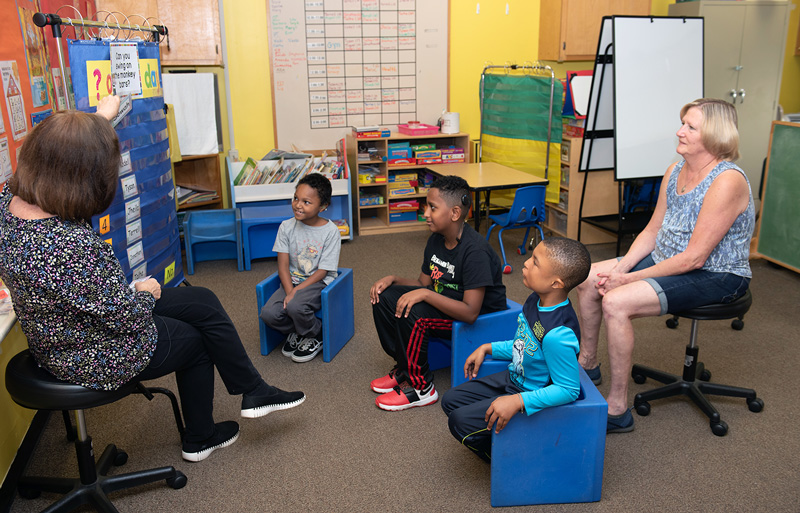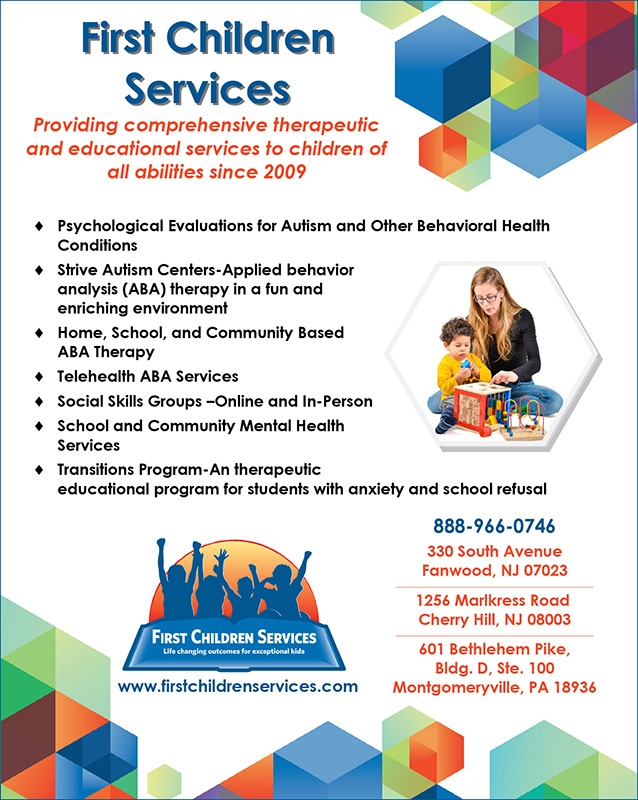An autistic child’s family is structured no different than that of neurotypical children. Families generally include parents and siblings with their own perspectives and issues. In the wake of substantial empirical support for the effectiveness of applied behavior analysis (ABA) interventions for promoting desired behavior change in ASD individuals, most ASD providers have adopted ABA treatment protocols that include individual treatment of the identified child; parent training to teach parents how to conceptualize, observe, record and, ultimately, to constructively intervene in accord with their child’s treatment plan. Social skills group treatment composed of small, homogeneous peer members are usually a component of ABA treatment as well.

Peggy Yorkovich, teacher at First Children School, goes over the lesson plan of the day
First Children Services (FCS) has increasingly focused on addressing the otherwise unmet emotional needs of parents and siblings in families with autistic children. Accordingly, FCS has evolved into an inter-disciplinary (“STRIVE”) model for delivering a comprehensive array of ASD services in both clinic and home settings. Psychological assessments as well as parent counseling and an array of individual and group sibling programs along with ABA services are now incorporated in ASD treatment plans. Our special needs school program focuses on maximizing parents’ engagement while fluidly and creatively weaving PT, OT, and speech services along with nursing and ABA supports into a student’s school day as needed. The balance of the article will offer a more in-depth portrayal of FCS’ clinical and educational supports in the quest to enrich supports for autistic children.
While 85% of autistic children exhibited developmental delays by 3 years old, the average age of diagnosis is still between 4 years and 5 years old (CDC, 2020.) Regrettably, 30% of children with autism had not received a formal diagnosis by age 8, significantly limiting their access to services. It has been reported that there is typically an 8-18 month waiting list for diagnostic evaluations at university-based hospitals, that most are not accepting patients above the age of 3, and very few private providers have the training or resources to evaluate young children which could allow qualification for insurance reimbursement.
Comprehensive autism screening and evaluation is a featured component of the STRIVE model. We serve individuals 2 years and older and our clients’ families can access state-of-the-art assessment by clinicians with training in clinical psychology, school psychology and behavior analysis. Diagnostic services are provided in our centers, through telehealth, and in collaboration with the child’s pediatrician. Diagnostic assessments are also available to our clients’ siblings as well as children in the community.
All STRIVE programs draw upon research-supported manuals and treatment protocols from the fields of applied behavior analysis (ABA), behavior therapy, cognitive behavior therapy, and acceptance and commitment therapy (ACT), and can be accessed through the child’s ABA program and integrated into family counseling. Research has demonstrated positive outcomes when parents and caregivers are directly involved in their child’s treatment. By integrating these core services, we can provide a longitudinal, barrier-free, comprehensive system of care for ASD individuals and their family. First Children’s STRIVE service-delivery model is generally unique to autism treatment programs but fully consistent with Best Practices in the broader behavior health care arena.
First Children School is an interdisciplinary special education model which serves children with substantial physical and developmental challenges. In addition to education and ABA therapy services, the students receive physical therapy, occupational therapy, and speech therapy. Most germane to this articles’ topic of supporting children and their family is the component of communication. It is the component that all successes are built upon.
First Children School realizes that supporting children and their families begins with communication. To facilitate communication our staff uses “Total Communication.” This encompasses all forms of communication such as verbal, sign language, pictures, devices, and assistive technology. One of the most meaningful supports we can offer a child and their family is the privilege of understanding as well as being understood. At times when there is a lack of communication, or delay in progress, it is extremely frustrating to both the child and the family. This often contributes to a rise in maladaptive behavior. Time after time we see improvements in behaviors with the genesis of language, whatever that looks like.
Families are very willing to learn and having a child with Autism does require additional learning on their part. Sign language classes, learning to use switches and devices, following up at home with the child’s therapists, and overcoming language barriers themselves all lead to the success of accessing the supports that are available.
Opportunities to communicate in the school occur in many ways. Formal team meetings are scheduled regularly and as needed and may include special education teacher, school nurse, social worker, school psychologist, Board Certified Behavior Analyst, teacher of the deaf, teacher of the visually impaired, physical therapist, occupational therapist, and speech pathologist. The composition of these interdisciplinary teams varies and depends on the current as well as changing needs of the student. The ability to meet and draw from a range of professionals with diverse experiences and expertise has enabled the staff to provide a comprehensive program that meets the complex needs of our population. Co-treatments, where two professionals provide intervention together, has also been a unique and effective component of our program. In this way, strategies and techniques across disciplines can be shared and implemented during sessions.
Ongoing communication between teachers and therapists has continued in virtual platforms initiated during the early days of the Pandemic. These newer methods for bringing staff together have included daily video conferencing, virtual IEP meetings and comprehensive updates on Microsoft TEAMS.
Parents continue as critical team members. Parents are always welcome to join therapy sessions. Participation in virtual sessions has also provided an unexpected opportunity to offer parental coaching in behavioral and communication strategies in the natural environment.
In summary, First Children Services is committed to the belief and practice of family engagement which requires excellence in communication with the consumers of our services. FCS has also enlarged the ABA treatment model for ASD individual to include timely access to both diagnostic assessment and counseling services for parents and siblings to address the range of emotional and behavioral challenges that often befall all family members.
Jeffrey Selman, PsyD, BCBA-D, is Vice President of Clinical Services and Howard Savin, PhD, is Chief Clinical Officer at First Children Services. Kathleen Gorski, M.ED, MAT, is Principal and Ellen D’Amato, PhD, is School Psychologist at First Children School.
For further information please contact jselman@firstchildrenservices.com or visit www.firstchildrenservices.com.





